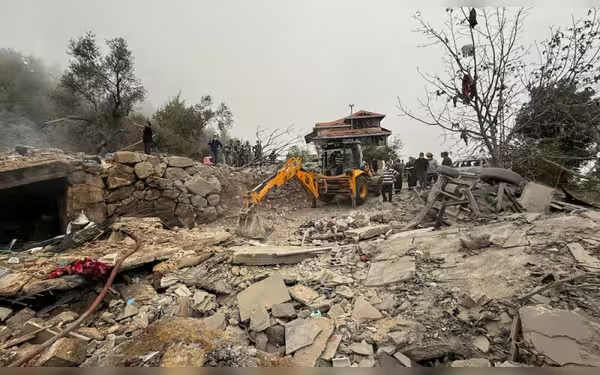Saturday, November 16, 2024 05:52 PM
Israel Airstrikes Target Aitou, UN Concerned for Peacekeepers
- Israel airstrikes in Aitou kill at least 21.
- UN expresses concern for peacekeeping forces' safety.
- Netanyahu vows to continue military operations against Hezbollah.
 Image Credits: brecorder
Image Credits: brecorderIsrael's airstrikes in Aitou result in 21 deaths, raising UN concerns for peacekeepers amid escalating conflict with Hezbollah.
In recent days, the conflict between Israel and Hezbollah has escalated significantly, drawing international attention and concern. On Monday, Israel launched airstrikes in northern Lebanon, specifically targeting the town of Aitou, which is predominantly Christian. This attack resulted in the tragic loss of at least 21 lives, according to health officials. The airstrike hit a house that was being used to shelter displaced families, highlighting the dire humanitarian situation in the region.
As the violence continues, millions of Israelis have been forced to seek shelter from retaliatory projectiles fired from Lebanon. The Israeli military reported that approximately 115 projectiles were launched by Hezbollah into Israeli territory on the same day. This ongoing conflict has roots that trace back to a year ago when Hamas began firing rockets at Israel, leading to a broader confrontation involving Hezbollah.
The United Nations Security Council has expressed strong concern regarding the safety of its peacekeeping forces in southern Lebanon, known as UNIFIL. Several of their positions have come under fire amid the clashes, raising alarms about the potential for further escalation. Prime Minister Benjamin Netanyahu has stated that Israel will continue its military operations against Hezbollah "without mercy, everywhere in Lebanon – including Beirut." This declaration underscores the seriousness of the situation and Israel's commitment to its military objectives.
In the wake of the airstrikes, rescue workers have been seen sifting through the rubble in Aitou, searching for survivors and assessing the damage. The Lebanese health ministry reported that eight additional individuals were injured in the attack. The destruction left behind, including burned vehicles and debris, paints a grim picture of the conflict's impact on civilian life.
As tensions rise, Netanyahu has rejected accusations that Israeli forces have intentionally targeted UN peacekeepers, labeling such claims as "completely false." He emphasized that Hezbollah has been using UNIFIL positions as cover for their attacks, which have resulted in Israeli casualties. In a bid to protect UN personnel, Netanyahu urged them to temporarily vacate combat zones near the Israeli border.
Despite the escalating violence, UNIFIL has reaffirmed its commitment to maintaining an international presence in southern Lebanon. The spokesperson for the peacekeeping mission stated, "We are staying … we are in south of Lebanon under a Security Council mandate." This commitment is crucial for ensuring some level of stability in the region, even as the conflict intensifies.
As the situation unfolds, the Middle East remains on high alert, particularly regarding potential retaliatory actions against Iran, which has been implicated in supporting Hezbollah. The U.S. has advised its citizens in Lebanon to leave immediately, reflecting the growing concern over safety in the region.
The ongoing conflict between Israel and Hezbollah not only poses a significant threat to regional stability but also has devastating consequences for innocent civilians caught in the crossfire. As international powers monitor the situation closely, the hope remains that diplomatic efforts can pave the way for a ceasefire and a return to peace. The humanitarian crisis resulting from this conflict serves as a stark reminder of the urgent need for dialogue and resolution in the region.













